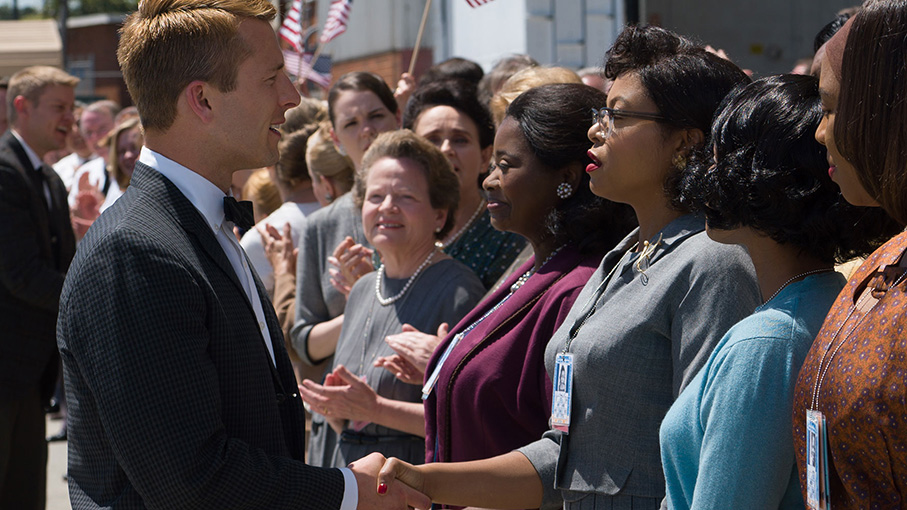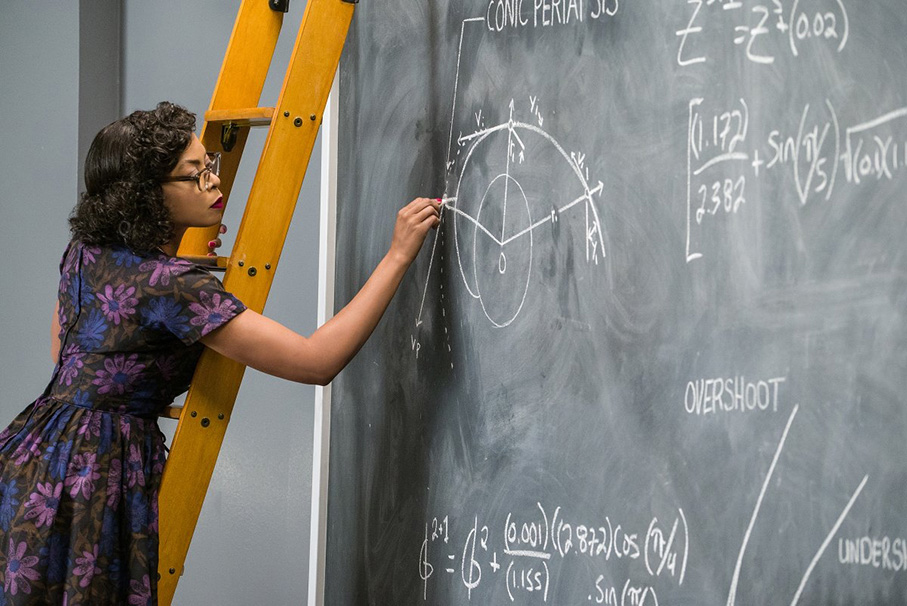| |
"First of all I couldn't believe it was true that there were women at all working at NASA because we were so sexist at the time. To further dig into it and discover that Katherine Johnson was the only person that [Astronaut] John Glenn trusted to run his numbers before his Friendship 7 launch. He is quoted as saying 'Get the girl to run the numbers, if she says they're good, they're good to go.' |
| |
Director Theodore Melfi* |
Melfi didn't believe it was true? He's not kidding. Given my own background, I was stunned by the reality of this story as I suspect most of its audience might be. I worked on the movie about the Mercury astronauts, The Right Stuff. No black female mathematicians there. Nothing got past me as a child if it had anything to do with the USA's space programme. I sat glued to the moon landing, gazed in awe at my completed Airfix™ model of the Saturn V rocket and still remember landing that model of my Lunar Module all over the house. Given all this wide-eyed, off-planet wonder, is it fair to conclude that 1969 was humankind's high point? We certainly haven't troubled the universe too much since and with all the problems on this planet rearing up like pestilential boils and cankers (I do appreciate the word 'trump' is the Scottish slang for 'fart'), we're unlikely to be back too soon. The universe sighs with some relief, I suspect. In the hugely sentimental but affecting Apollo 13, there were no black female mathematicians there either. You'd strain to catch sight of a single woman at mission control and then historically she was probably a white wife of one of the white men. Also in that film, someone pulls out a slide rule, a calculating device now consigned to post digital oblivion but it served all too well to remind me just how old school the Apollo missions were. And into this hallowed macho environment stepped three women, all previously buffeted and weighed down by the yoke of history and the virtual and very real apartheid that existed as America squeezed itself into the liberating anti-corset of the hallowed 1960s.

Rosa Parks is the figure often quoted as the touch paper of the Civil Rights Movement, the woman who refused to give up her seat to a white person on a crowded bus just because the 'Whites Only' area was full. The real start of a revolution began, satisfyingly, with the young of a segregated school. Unburdened by adult prejudices and living lives shaped by negative experiences of the patently unfair racial separation, a group of high school children in Virginia refused to segregate, going against what was known as the Jim Crow law. It went to the Supreme Court, which found the notion of segregation unconstitutional (hurrah, where's the fecking Supreme Court today?). So in 1961, America was a seething cauldron of racism, counter-racism and grass roots political work was on the cards to shift America's darker, right wing underbelly into the harsh light of the Constitution and to note in law what the 'self evident truth' of the Declaration of Independence actually was. It was the idea that 'All men are created equal...' We can add 'women' or change the line (is that legal?) to 'All people are created equal.' Wise man, Thomas Jefferson. In this environment we meet three friends, three women, three black women... with minds worth celebrating to the nth degree (and all three would know just how to calculate that).
Taraji P. Henson plays mathematician Katherine (Goble) Johnson, Octavia Spencer plays mathematician and supervisor Dorothy Vaughan and Janelle Monáe plays Mary Jackson, a mathematician who becomes NASA's first black female aerospace engineer. These three women were at the heart of NASA and its nascent space programme and up until this movie, I'd never heard of any one of them. That's a slap on my wrist to have allowed – albeit unwittingly – this history to be literally whitewashed – history is written by the winners, remember – and a great pat on six singular shoulders that went against 'conventional' wisdom and conventional anything at all. We start their story on the road to establish the casual normality of racism in Virginia. A cop suggests that these women's very beings pose a threat to his insular and closed society but those wonderful four letters of hope and extraordinary achievement (N, A, S and A) seduces him enough to have him escort these uncommonly bright women to where they will thrive. Once they get there, it's established that the 'damned Ruskies' have succeeded in sending a dummy and a dog into space. This lights the fire under the US administration and Al Harrison (a perfectly cast Kevin Costner) is given the sternest rebuke. For the man with one of the most difficult jobs in the world (putting a man in space and getting him safely home again), Costner has to rely on his team. Unfortunately, one of his managers (Big Bang Theory's Jim Parsons) is severely put out by the arrival of Katherine, a human computer with phenomenal mathematical skill and it's his conflict with her that drives the first half of the movie. She is (horror!) a woman and (double horror!) black. She's also a mathematical genius.

Before we venture further, let's assume a few things, assumptions that turn out to be fairly associated with this particular movie. This film is a perfect example of a present looking into a past with a knowing wink saying "Wasn't it unbelievable how black people were treated fifty-five years ago?" It also ticks all the boxes of the underdog in society proving to those 'above' them that their talents far outstrip any normal person's. There are many moments of "In 1961, I'm black and I can compute faster and more accurately than most," which are undeniably entertaining. In fact, unlike The Imitation Game (which had many such moments minus the black part), a movie that was more a character study of Alan Turing, Hidden Figures is a radical invite for us to see people more clearly. Benedict Cumberbatch's Turing was tortured but to that film's credit, it survived 'that moment', the moment when the machine worked, a scene of such emotional heft that could easily have unbalanced the film if that heft didn't actually appear as the climax. I still replay that eureka moment on its own because it is so satisfying. This movie has similar "Go girl!" moments but the simplicity in which the context of the moments is presented should not belie the work that went into achieving them. And hand on heart, those moments are still hugely emotionally rewarding. And I say those words with fifty years of film going behind me. I still adore the effect and machinations of the man behind the curtain knowing full well the man is behind the curtain. I'm a puppet thankful of his strings.
The three women all have professional aspirations within NASA and go about these goals with a nervous and hesitant forward step. Dorothy has been supervising for a decade but cannot get her breezily insouciant boss (a casually 'status quo' accepting Kirsten Dunst) to recognise her authority and award her the official status she craves. So she steals library books to learn IBM's programming language to get a head start on 'the future', IBM's computers that will put mathematical wizards out of a job. Mary is put on the path to become an engineer in one of the film's most uplifting fist pumps. She accepts she will move no further because of her sex and colour. Her male boss says (I'm getting teary just remembering it) "And I'm a Polish Jew whose parents died in a Nazi prison camp. Now I'm standing beneath a space ship that's going to carry an astronaut to the stars. I think we can say, we are living the impossible..." But the film is centred around Katherine and her struggle with the white hierarchy. Her loo breaks become a race issue both in colour and how fast she can run. Am I alone in believing that segregated toilets were actually necessary? How could such an advanced society (soon to land a man on a different planet) look at skin colour and say "BEWARE, DIFFERENT!" and segregate two 'races'? Jesus, it seems almost comical were it not so true.
Hidden Figures presents a part of history of which most of us are (or were) ignorant. It also suggests that darker skinned females had a gift for mathematics. Try getting a research grant to figure that out. It also features (mercifully, not in slow motion) an homage or blatant steal from The Right Stuff. Dorothy has convinced the white hierarchy that she needs her black, female computers to work the IBM machines. As they all walk down the corridor, I'm immediately reminded of the Mercury astronauts' march down a similar corridor, fully space suited up in Phil Kaufman's movie (it was actually a real corridor in the production offices). Suffice to say, it evoked a frisson of delight. If your tastes are aimed toward outsider cinema (naturally, given our URL) then you may rightfully dismiss Hidden Figures as a Hollywood 'feel good' movie. But if you want to expand your awareness of history and the role of surprising human beings being involved in the space race, then this is the movie for you. I'm still smiling at equations I do not understand but know that others do. And those equations thrust us into the universe, the homo sapien in all his/her colour and glory. Just wonderful.
|